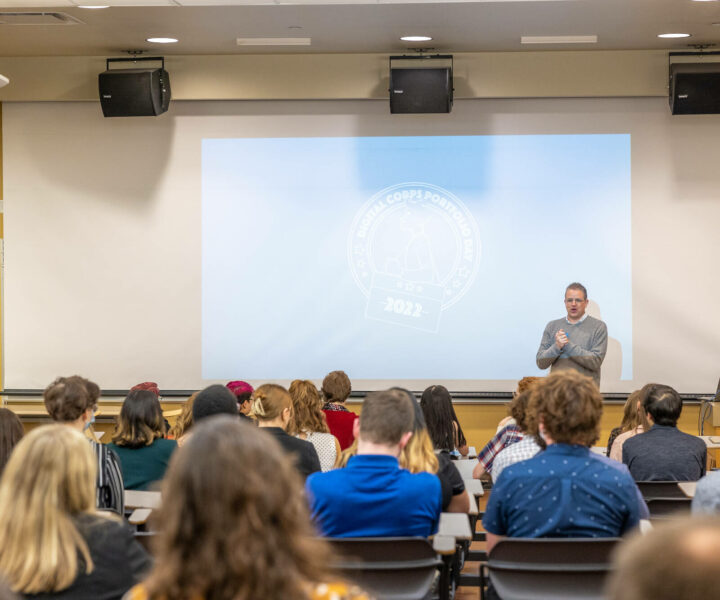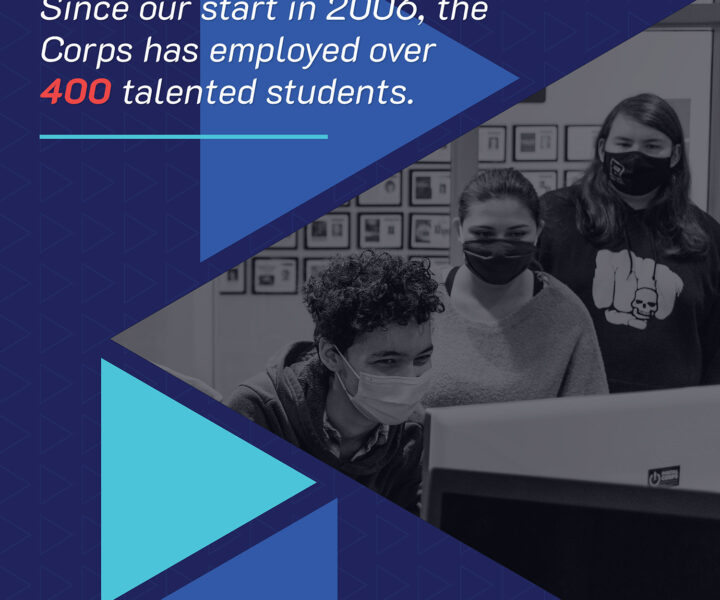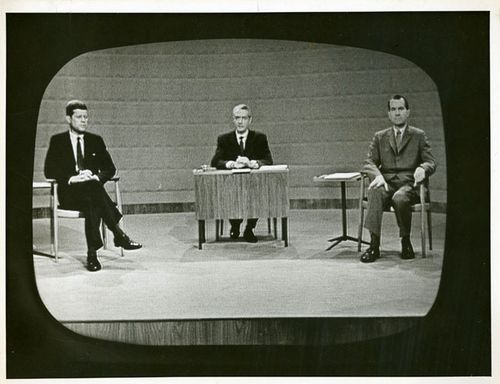It’s no secret that hard work and success lead to automatic happiness, right? We make goals for ourselves, achieve them, set another, and continue this endless cycle, but where does happiness fit into this seemingly simple equation? A survey conducted by Udemy found that out of 1,000 full-time American employees, 50% reported they feel more stressed today than they did a year ago. Where is the happiness we associate with hard work and success? Do we keep working hard and meeting goals only to have a short burst of happiness, or do we hold the power to rewire our positivity and ultimately change how we view the world and, in conjunction, our work? This exact idea was recently tested by a group of Digital Corps students and staff who sat down to discuss this idea of “better work.”
“I think it’s important to have these discussions to have a sense of community and socialization while also holding serious conversations about a variety of topics that encourage better understanding of these topics and how they can relate to our lives!”
-Jolee Edge on why TED Talk Discussions at the Digital Corps matter
The Task at Hand
As part of a TED Talk discussion led by Jolee Edge, a Graduate Assistant at the Digital Corps, the small group of students and staff watched psychologist Shawn Achor’s TED Talk entitled “The Happy Secret to Better Work.” After watching the video, students and staff met via Zoom to discuss their thoughts and comments and to undertake Achor’s challenge to improve their quality of work and life.
Through his research, Achor found that success does not create happiness. He discovered that as you make new achievements, your brain begins to set higher goals for itself to reach, creating an endless cycle of achievement that is out of reach. Throughout the TED Talk, Achor challenged listeners to rethink their assumptions about success creating happiness. He provided 5 small changes that could assist in rewiring our brains to be more positive, and in turn increase productivity, creativity, energy, and intelligence. They are:
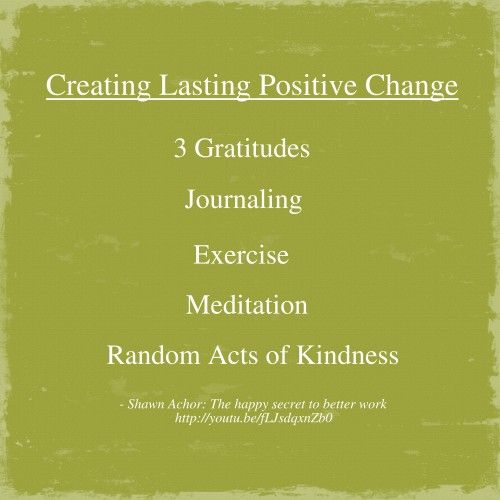
Students and staff discussed the changes they would make as well as the various barriers that could stop them from reaching their goal. One topic that was prevalent among the participants was the ongoing Coronavirus pandemic, which has affected overall positivity and motivation for many people. Digital Corps students have struggled to stay positive and motivated because they now work remotely outside of our typically fun, engaging, and productive office.
Amelia Cisna, a Communications Specialist at the Digital Corps, noted that “Working at the Corps during the pandemic has been especially hard, since it’s normally a very collaborative office. It’s been harder to stay motivated when our office culture is hindered in a sense; I definitely thrive in social environments, so having to social distance and communicate mostly online has been difficult to adapt to.” Cisna took the challenge and found that it “forced [her] to recognize all of the opportunities” she still has, like attending Ball State and working at the Digital Corps.
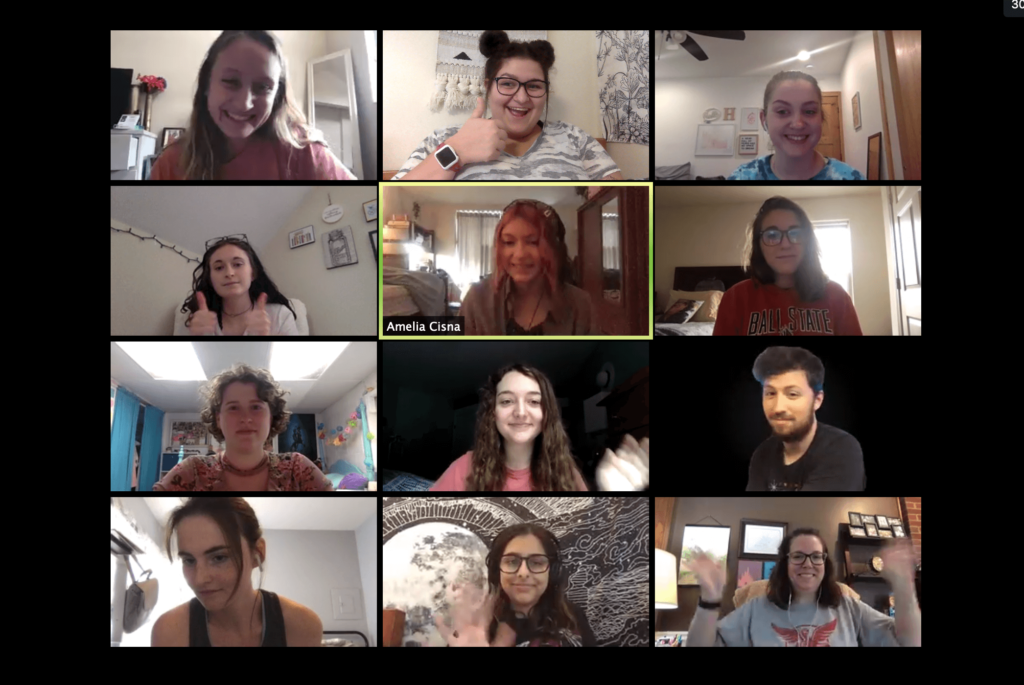
After discussing the video and choosing which changes the students and staff would make, participants were then randomly paired with a buddy who would hold them accountable and check in on how their desired changes affected them. Finally, the video posed one main idea that stuck out from the rest and would serve as a guide for the challenge: Individuals ultimately shape the way they choose to see the world, which affects how content they feel about their reality. With this idea in mind, the group of Digital Corps students and staff took the 21-day challenge to rewire their positivity and alter the way they see the world with just a small, simple change.
Students and Staff Take the Challenge
Everyone was excited to see how the changes they made would affect their positivity and work performance. Genevieve Eldred, a Design Apprentice, originally took the challenge because she wasn’t sure how the semester would go. “I chose to journal, and I was able to keep with it and it actually was really helpful,” Eldred says. She struggled to stay motivated to journal, but she persisted and kept up with her goal. Eldred states, “As a result, I have only seen that it makes me more positive and able to go with the flow, both in life and at work.”

Video Specialist Lochlin Peters wrote down 3 positive things and limited his social media usage. Peters wanted to stray away from the negative side of social media and focus on the best things throughout his days to boost his positivity. “It was tough keeping up with both, but I certainly did both more often than I did before the challenge. I’d say I did see an increase in my positivity particularly when writing/thinking back on the positive moments of my day,” says Peters. Overall, he is glad that he took the challenge, and he can see how it has encouraged him to be more thoughtful.
One student who found the challenge especially tough was User Experience Specialist Hailey Leonard. “I chose to focus on exercise, since I don’t do that as much with being remote for both classes and work…I was hoping that it would encourage me to go outside more, since being remote has kept me indoors more than I would usually be,” Leonard describes. Unlike other students, however, Leonard found it especially hard to stay motivated to do the challenge, and while she did occasionally exercise by going on frequent walks, the chaos of online classes, work, and other commitments made it tough for her to keep up. For Leonard, the motive was a great initiative and effort to take, especially in the current climate of the world. Even though keeping up with the challenge was rough, she still was able to dedicate some time to meeting those goals she set.
After the Challenge
After 21 days, students and staff met again to discuss how the challenge went for them, and the coronavirus persisted as a hot topic. For some students, completing their goals became impossible because of COVID-19 barriers. Some students struggled because they were exposed to COVID-19 and had to quarantine. For many of the students, this put a wrench in the challenge and didn’t help with their positivity levels.
However, the participants said they had a good experience doing the challenge, with some saying that they would want to try the challenge again. But were the changes worth it? Well, students and staff found that the 21-days didn’t have much of a difference. However, some participants found it helpful for the short time during the challenge.
Overall, the challenge did prove to have some ups and downs. Despite decreased morale from the pandemic and other daily obstacles, those who took the challenge felt good when completing their goals and saw this impact their life and their performance at work. Some students rewired their brains and noticed a sense of happiness and increased productivity while they worked. The challenge, while difficult at times, was useful, and students hope to continue using the goals they chose as a part of their daily lives to increase their positivity. The Digital Corps constantly encourages its students to strive to be the best that they can be and to push themselves to exceed expectations, but staff and students should also celebrate small victories as well. Ultimately, the real secret to happiness and better work is self-care.

